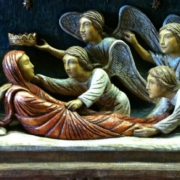
We are now in Advent, preparing to celebrate the birth of Jesus at Christmas. Many modern secularists find it very difficult to believe in the possibility of miracles, such as the virginal conception of Jesus. They say that the ancients were quite gullible to believe this, and that modern humanity is far too “educated and enlightened” to fall for such “nonsense”. How can we respond to this?
At one level, this is nothing more than chronological snobbery. In a recent article, RZIM apologist Jill Carattini responds to this fallacious line of reasoning:
In his 1945 essay “Religion and Science,” C.S. Lewis exposed one of the most common false assumptions at the heart of the science/faith divide, particularly as it pertains to the nativity of Jesus. The assumption is that this “primitive” nativity was likewise filled with primitive thinkers devoid of any sort of knowledge of biology or natural reasoning. Here and elsewhere, Lewis saw that we hold our scientific advancements as something like demerits for prior generations, perpetuating the mentality that the only accurate thought is current thought, the only mind worth trusting is an enlightened one—of which I am conveniently a member.
The disciples…knew enough about the laws of physics to be completely terrified by the man walking on the water toward their boat. The crowd of mourners knew enough about death to laugh at Jesus when he insisted that the dead girl was only sleeping, and to walk away astonished when she came back to life. There were also the magi, astrologers who followed their scientific calculations to the child, Philip and Andrew who knew that the mathematics of two fish and a starving crowd were not going to divide well, Mary and Martha who knew that their brother’s death was the last word, and Thomas who knew the same after he watched Jesus crucified.
In each of these objections, I thankfully hear my own. So much so, that it would appear faith is not a turning of one’s back on the fixed laws of nature or physics or mathematics, but rather, a recognition in the very face of these laws we know and trust that something from outside the law must have reached into the picture. I find each of these scenes both remarkable and reasonable precisely because of the reactions of men and women with a grasp of natural law and the same objections that any of us would have offered had we been present. It would be blind faith indeed if we were receiving a story that wanted us at the onset to fully reject the laws of natural reasoning in replacement of something else. What we receive instead is a story filled with undeniable indications which suggest that something—or Someone—has startlingly stepped into the picture.


